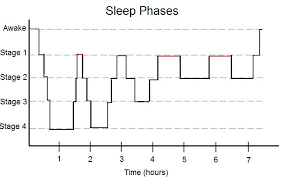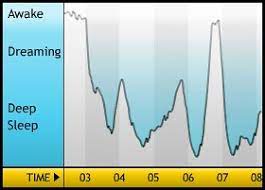Low Testosterone Might Mean Poor Sleep Need Testosterone Hormone Injections

Sleeping Issues Tied to Low-T
Testosterone has a complex and widespread effect on physiological function. Most people think of Testosterone strictly as a hormone related to sexual function. Still, Testosterone plays a role in various other systems—one area where Testosterone (or the lack of Testosterone) can significantly impact is sleep.
Have You Had Trouble Sleeping?
Many men report that, as they get older, they start having more and more trouble sleeping. Have you caught yourself laying in bed, staring at the ceiling, more often than you'd like to admit? Do you wake up in the middle of the night, unable to fall back asleep? This may be a symptom of Testosterone Deficiency.
Testosterone and Sleep Quality
Low-T may affect not only your ability to stay asleep but the quality of your sleep as well. As we sleep, the human body goes through different phases of sleep, all of which are important.
What Are the Normal Sleep Phases?
There are five stages of sleep, all of which are important to getting the most restful night possible. When we first fall asleep, we enter Stage 1, which is characterized by a pattern of falling in and out of light sleep. During this phase, we are most prone to waking and also to being jolted awake by the feeling of falling. During this phase, the muscles and the eyes are still active, but minimally.
As we fall deeper into rest, we enter Stage 2, characterized by a combination of suppressed brain activity and occasional flourishes of neuronal activity.  Stage-3 comprises Delta Waves, the slowest rate at which our brains operate under normal circumstances.
Stage-3 comprises Delta Waves, the slowest rate at which our brains operate under normal circumstances.
The brief bursts of activity from Stage-2 slow down but remain far more active than Delta Wave. During stage three, all muscle and eye movements cease. Stage-4 is the deepest form of sleep and consists almost entirely of Delta-Wave activity.
The first two sleep phases are considered light sleep, whereas the latter is considered deep sleep. There is a fifth stage of sleep, which is incredibly important. It is known as REM Sleep, REM an abbreviation for Rapid-Eye Movement.
The first half of the regular sleeping pattern is characterized by a slow progression to deep sleep, while the latter half of the night is a shift back and forth from REM Sleep and an increasingly lighter and shorter reversal of the other four phases. REM Sleep is strongly associated with memory and learning and is the period in which we dream.
Testosterone and Sleep Phases
Testosterone Production is tied directly to sleep phases. Testosterone Levels during sleep peak around the time that the first phase of REM-Sleep begins and remain elevated for the rest of the night under normal circumstances. Testosterone Production ramps up as we enter stages three and four of deep sleep.
If poor sleep prevents us from sustaining deep sleep for a sufficient time, testosterone levels fall. As men enter their fifties and sixties, sleep issues become more and more common.
Recent research suggests that Low Testosterone Levels may account for as many as one in five men's sleep issues. The typical sleep pattern results from a complex interplay of cerebral and physiological sequences, and Testosterone Deficiency impairs the body and mind's systems and aspects from working together in appropriate synchronicity.
Testosterone and Insomnia
Another sleep-related condition that impairs normal Testosterone Secretion is insomnia. Insomnia is a condition where it is incredibly hard to fall asleep, leaving some patients up all night, perhaps falling into occasional periods of light, fitful sleep at best.
Insomnia is a spectrum condition, with some patients experiencing minor, occasional bouts and others struggling with the condition for days, months, years, or even their entire life.
Testosterone Production is susceptible to periods of inadequate sleep. One study suggests that even a single week of insomnia can impair Testosterone Production by around 15%. Sometimes Insomnia is the result of poor sleeping habits; other times, it is the result of underlying physiological or neurological issues.
If you are worried about your Testosterone Levels, it's essential to improve your sleeping habits. Some steps you can take to improve your sleeping habits are avoiding caffeine at night, installing blackout curtains, turning the television off in the bedroom, and simply having a more rigorous bedtime. If your efforts at improvement don't impact insomnia, you should see a sleep specialist.
What Is Sleep Apnea?
Sleep Apnea is a common condition where your body doesn't get enough airflow while you sleep. This can result in shallow breathing for some patients, while others stop breathing for brief periods throughout the night. The range at which breathing can pause varies due to the severity of the Sleep Apnea and other factors.
Breathing can stop for simple moments at a time or much more extended periods, even minutes. In severe cases, breathing can stop more than thirty times each hour.
When oxygen supplies drop to a certain level in the bloodstream, the body recognizes it's choking and reinitiates breathing with a start, often associated with a choke or a snort. Sleep Apnea severely impairs sleep quality because it prevents the brain from naturally moving along the typical pattern of sleep phases. As a result, Sleep apnea often causes significant fatigue and exhaustion throughout the day.
Testosterone and Sleep Apnea
Sleep apnea's lengthy pauses in breathing lead to repeated awakenings as the body struggles to recover oxygen to stabilize its functions. Sleep fragmentation leads to chronic sleep deprivation, excessive daytime sleepiness, and other sleep disorders like insomnia.
While we are sleeping, the brain and body go into full repair mode. While we sleep, our bodies recover from the previous day and prepare us for the next day. Sleep enhances functions from cell to cell and system to system, providing energy and keeping us healthy.
One of the vitally important aspects of sleep is hormone maintenance. The body releases the highest quantities of many of the essential hormones while  we are asleep. Testosterone and Human Growth Hormone are primarily released at night. The body releases the majority of its Testosterone while we are in deep sleep.
we are asleep. Testosterone and Human Growth Hormone are primarily released at night. The body releases the majority of its Testosterone while we are in deep sleep.
Sleep Apnea prevents deep sleep, causing Testosterone Levels to plummet. Testosterone Levels drop as the day proceeds to a close, and the body restores Testosterone up to peak levels as we sleep.
Testosterone Deficiency can also contribute to sleep apnea. Patients with Low-T are more likely to be overweight and have diminished muscle mass, both of which can cause their airways to be impaired while they sleep.
Sleep Apnea Treatment to Increase Testosterone Levels
So Sleep Apnea and Testosterone Deficiency combine to create a double-edged sword. Low-Testosterone Levels make Sleep Apnea more common and problematic, and Sleep Apnea suppresses Testosterone Levels.
Getting tested and treated for Sleep Apnea is one way to help support healthy and normalized Testosterone Production. There are breathing machines, breathing masks, and other tools which can create airflow and prevent Sleep Apnea. Some patients may even benefit from surgery.
Testosterone Replacement Therapy for Better Sleep
As you can tell, Testosterone plays a decisive role in your ability to get healthy and restful sleep. Testosterone Deficiency causes many problems for patients, and not enough men seek a Hormone Specialist that can get them the prescription testosterone they deserve.
We are a Licensed and Board Certified Hormone Clinic that operates in all fifty states. If you believe that Testosterone Therapy can help improve your life, we encourage you to contact us by phone or form to get in touch with one of our professionally trained Hormone Doctors.
We also offer a variety of other HRT Programs that may interest you, including Human Growth Hormone Replacement Therapy, HCG Injections for Weight Loss, and Sermorelin Acetate HGH Booster, among others. We look forward to hearing from you if you have any questions or comments!
- What Are Normal Testosterone Levels For Men And Women Throughout Life? [Last Updated On: February 14th, 2025] [Originally Added On: May 26th, 2020]
- Top Tips For Boosting Testosterone Naturally [Last Updated On: November 6th, 2024] [Originally Added On: May 27th, 2020]
- The Testosterone Factor [Last Updated On: December 23rd, 2024] [Originally Added On: May 28th, 2020]
- Testosterone Can Help Relieve The Menopause Symptom Of Hot Flashes [Last Updated On: February 14th, 2025] [Originally Added On: May 29th, 2020]
- How Does Low Testosterone Cause Infertility? [Last Updated On: February 8th, 2025] [Originally Added On: May 30th, 2020]
- The Benefits Of Testosterone Therapy For Prostate Cancer [Last Updated On: February 14th, 2025] [Originally Added On: May 31st, 2020]
- Is Testosterone Replacement A Valid Diabetes Treatment? [Last Updated On: February 15th, 2025] [Originally Added On: June 1st, 2020]
- Testosterone Shock Therapy May Be An Effective Prostate Cancer Treatment [Last Updated On: February 5th, 2025] [Originally Added On: June 2nd, 2020]
- Testosterone Replacement Therapy Is Safe For The Heart [Last Updated On: February 14th, 2025] [Originally Added On: June 3rd, 2020]
- Testosterone Replacement Therapy [Last Updated On: December 20th, 2024] [Originally Added On: June 4th, 2020]
- Testosterone Patches [Last Updated On: February 8th, 2025] [Originally Added On: June 5th, 2020]
- Testosterone Overview [Last Updated On: February 13th, 2025] [Originally Added On: June 6th, 2020]
- Testosterone Levels And Making Money [Last Updated On: October 19th, 2024] [Originally Added On: June 7th, 2020]
- Testosterone Enanthate [Last Updated On: October 18th, 2024] [Originally Added On: June 8th, 2020]
- Increased Awareness Of Low-t Helps Men Live Healthier Lives [Last Updated On: February 7th, 2025] [Originally Added On: June 9th, 2020]
- How Does Low-t Lead To Erectile Dysfunction? [Last Updated On: February 7th, 2025] [Originally Added On: June 10th, 2020]
- Testosterone Basics [Last Updated On: February 6th, 2025] [Originally Added On: June 11th, 2020]
- How Does Testosterone Impact Prostate Health? [Last Updated On: February 6th, 2025] [Originally Added On: June 12th, 2020]
- Testosterone And Other Sex Hormones Impact Asthma Response Dependent On Sex [Last Updated On: February 5th, 2025] [Originally Added On: June 13th, 2020]
- Recognizing Subtle Symptoms Of Testosterone Deficiency [Last Updated On: February 4th, 2025] [Originally Added On: June 15th, 2020]
- Testosterone Trivia [Last Updated On: February 4th, 2025] [Originally Added On: June 16th, 2020]
- The Health Benefits Of Testosterone And Sleep Are Interconnected [Last Updated On: February 3rd, 2025] [Originally Added On: June 17th, 2020]
- How Can I Restore My Testosterone Production Naturally? [Last Updated On: October 13th, 2024] [Originally Added On: June 18th, 2020]
- Low-t Quiz [Last Updated On: October 12th, 2024] [Originally Added On: June 19th, 2020]
- Low Testosterone Contributes To Frailty With Age [Last Updated On: October 10th, 2024] [Originally Added On: June 21st, 2020]
- Low Testosterone Affects A Third Of Young Men With Type 2 Diabetes [Last Updated On: October 9th, 2024] [Originally Added On: June 22nd, 2020]
- Japanese Testosterone Study Proves Physical And Psychological Benefits [Last Updated On: October 8th, 2024] [Originally Added On: June 23rd, 2020]
- Intramuscular Injections Are Safer Procedures [Last Updated On: October 7th, 2024] [Originally Added On: June 24th, 2020]
- Injecting Testosterone (im) [Last Updated On: December 21st, 2024] [Originally Added On: June 25th, 2020]
- Injectable Testosterone And Testosterone Cream [Last Updated On: February 14th, 2025] [Originally Added On: June 26th, 2020]
- Indiana Jones Vs. Rambo (hgh Testosterone) [Last Updated On: October 6th, 2024] [Originally Added On: June 27th, 2020]
- How Much Does Testosterone Control Men's Behavior? [Last Updated On: October 5th, 2024] [Originally Added On: June 28th, 2020]
- Getting To The Bottom Of Low-t Under-reported Sources Of Testosterone Deficiency [Last Updated On: February 14th, 2025] [Originally Added On: June 29th, 2020]
- How To Manage And Overcome Testosterone Deficiency [Last Updated On: October 4th, 2024] [Originally Added On: June 30th, 2020]
- Clomiphene Low-testosterone Andropause Treatment [Last Updated On: February 3rd, 2025] [Originally Added On: July 1st, 2020]
- How Do Synthetic Chemicals Impact Testosterone Secretion? [Last Updated On: September 26th, 2024] [Originally Added On: July 2nd, 2020]
- Interest In Bio-identical Testosterone Is Skyrocketing [Last Updated On: October 3rd, 2024] [Originally Added On: July 3rd, 2020]
- Axiron Spray-application Testosterone Replacement Therapy [Last Updated On: October 2nd, 2024] [Originally Added On: July 4th, 2020]
- Andropause: Male Menopause [Last Updated On: October 24th, 2024] [Originally Added On: July 5th, 2020]
- Testosterone Deficiency Treatment Options [Last Updated On: September 29th, 2024] [Originally Added On: July 6th, 2020]
- The Facts About Testosterone Hrt For Low-t [Last Updated On: September 30th, 2024] [Originally Added On: July 7th, 2020]
- Misconceptions About Testosterone Replacement Therapy [Last Updated On: October 1st, 2024] [Originally Added On: July 8th, 2020]
- Testosterone Replacement Therapy Facts And Myths [Last Updated On: October 23rd, 2024] [Originally Added On: July 9th, 2020]
- Testosterone Injections For Testosterone Deficiency [Last Updated On: September 18th, 2022] [Originally Added On: July 10th, 2020]
- Testosterone Replacement Therapy May Help Aging Males Prevent Diabetes [Last Updated On: September 27th, 2024] [Originally Added On: July 11th, 2020]
- The Benefits Of Testosterone Replacement Therapy For Women [Last Updated On: September 25th, 2024] [Originally Added On: July 13th, 2020]
- How Can Testosterone Hrt Improve My Life Via Quality Low-t Treatments [Last Updated On: October 22nd, 2024] [Originally Added On: July 14th, 2020]
- Frequently Asked Questions About Testosterone [Last Updated On: September 28th, 2024] [Originally Added On: July 15th, 2020]
- Bio-identical Testosterone Cypionate Injections [Last Updated On: September 24th, 2024] [Originally Added On: July 16th, 2020]
- All About Testosterone Creams [Last Updated On: September 21st, 2024] [Originally Added On: July 17th, 2020]
- Low Testosterone Treatment Protocols [Last Updated On: July 1st, 2024] [Originally Added On: July 19th, 2020]
- Testosterone Deficiency Drains Your Energy [Last Updated On: February 13th, 2025] [Originally Added On: July 21st, 2020]
- What Is Testosterone? [Last Updated On: September 19th, 2024] [Originally Added On: July 23rd, 2020]
- Eleven Signs Of Testosterone Deficiency [Last Updated On: June 29th, 2024] [Originally Added On: July 26th, 2020]
- Hypertension-Associated Cardiovascular Risks Increase Due To Both Low-T And High Testosterone [Last Updated On: February 18th, 2025] [Originally Added On: April 22nd, 2021]
- Everything to Know About Androgel [Last Updated On: June 26th, 2024] [Originally Added On: July 8th, 2021]
- Kinds of Testosterone Therapy – Which Is Right for You? [Last Updated On: March 21st, 2025] [Originally Added On: August 28th, 2021]
- This Study Says High Protein Diet May Suppress Testosterone Levels [Last Updated On: February 20th, 2025] [Originally Added On: March 28th, 2022]
- Testosterone and Estrogen Deficiency Associated With Increased Risk of Rotator Cuff Surgery [Last Updated On: February 14th, 2025] [Originally Added On: April 26th, 2022]
- Low Testosterone Accelerates Aging [Last Updated On: March 20th, 2025] [Originally Added On: May 3rd, 2022]
- Low Testosterone Endangers Your Health [Last Updated On: February 14th, 2025] [Originally Added On: May 14th, 2022]
- Testosterone Helps Modulate Immune Activity in the Digestive System [Last Updated On: February 14th, 2025] [Originally Added On: May 18th, 2022]
- Did you know: Testosterone treats depression! [Last Updated On: December 28th, 2024] [Originally Added On: May 19th, 2022]
- Benefits of Fenugreek – Boost Testosterone and More [Last Updated On: February 14th, 2025] [Originally Added On: May 23rd, 2022]
- Testicle Tanning: What is Tucker Carlson Talking About? [Last Updated On: July 17th, 2024] [Originally Added On: June 3rd, 2022]
- Using Testosterone to Combat Memory Issues in Diabetics [Last Updated On: February 14th, 2025] [Originally Added On: August 16th, 2022]
- About 40% of Men Have Low-T – and it Doubles the Risk of Severe COVID [Last Updated On: February 25th, 2025] [Originally Added On: September 21st, 2022]
- The Foods To Boost Your Testosterone…And The Foods To Avoid [Last Updated On: December 27th, 2024] [Originally Added On: September 30th, 2022]
- Tlando Testosterone: An Innovative Oral Therapy for Low-T [Last Updated On: December 27th, 2024] [Originally Added On: October 1st, 2022]
- Testosterone Replacement Therapy (TRT) Explained [Last Updated On: July 9th, 2024] [Originally Added On: October 12th, 2022]
- Examining The Link Between Testosterone and Employability [Last Updated On: February 18th, 2025] [Originally Added On: November 8th, 2022]
- Standard Measure of Low Testosterone Doesn't Apply to Young Men [Last Updated On: March 12th, 2025] [Originally Added On: November 8th, 2022]
- Surprising Things that Cause Men’s Crashing Testosterone [Last Updated On: March 17th, 2025] [Originally Added On: January 5th, 2023]
- Understanding the Correlation between Testosterone Levels and Job Performance [Last Updated On: February 9th, 2025] [Originally Added On: February 9th, 2025]
- Link between Low Testosterone and Severe COVID Symptoms in Men [Last Updated On: February 12th, 2025] [Originally Added On: February 12th, 2025]
- The Good Job Grip: Is Testosterone the Key? [Last Updated On: February 13th, 2025] [Originally Added On: February 13th, 2025]
- Importance of Nutritional Balance in a Healthy Diet [Last Updated On: February 14th, 2025] [Originally Added On: February 14th, 2025]
- Invigorating Power of the Fenugreek Plant: A Natural Testosterone Energizer and More [Last Updated On: February 14th, 2025] [Originally Added On: February 14th, 2025]
- Unlocking the Testosterone Treasure: A Panacea for Cognitive Woes in Diabetic Patients [Last Updated On: February 14th, 2025] [Originally Added On: February 14th, 2025]
Word Count: 1300







